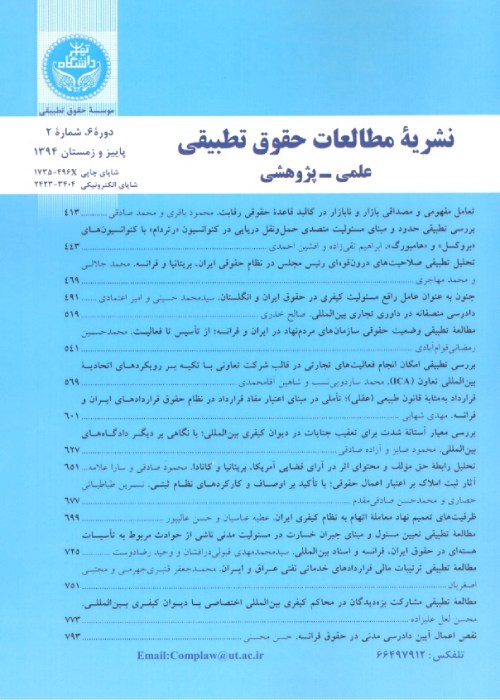Sharing Credit Information in Iran with Regard to the World Bank Doing Business Indicator
Nowadays, most countries worldwide have chosen the improvement of their business environment and removing barriers to private sector’s activity as one of their economic development strategies; such approach clearly paves the way toward attracting investment and boosting employment. Accordingly, the World Bank measures the improvement of the business environment in countries with the aid of some indicators, among which getting credit is of utmost importance. It is obvious that credit is one of the most fundamental sources of financing economic activities. Iran's rank in this index in 2020 was 127th out of 190 with a score of 58.5. This rating was based on the average rank of countries in the business elements. In the Business Report for 2019, Iran was ranked 128th with a score of 56/98 Giving credit, like other types of economic activities, needs valuable information which can principally be achieved by joining information sources and by using the intermediaries of credit information sharing (credit rating agencies). Credit information sharing in the form of credit rating agencies is relatively a newborn legal issue in Iran and its legal history is not so week. Although, the legal status of such agencies needs to be preferably determined by the statue, currently a bylaw, the so called Credit Rating Regime Bylaw, discusses its relevant issues. However, it seems that the improvement of the Iran's business environment ranking and economic development necessitates to establish the institutional, economic, and more importantly legal framework of such credit rating agencies. The importance and novelty of this subject matter as well as its relevant recently issued bylaw requires its research and scrutiny by the experts. It should be noted that in Iran, unlike in many developed countries, the sharing of commercial credit information was limited to communications between banks and some insurance companies, and it is not too late to establish a database for collecting credit data and credit rating companies. Indeed from 2007 In some laws a few articles have been devoted to the point. “The law on Comforting Banking Facilities and Reducing Project Costs and Accelerating Implementation of Production Plans and Increasing Banking Resources and Banking Efficiency” was initiated in this regards. Credit ratings largely depend on the administrative arrangements of the countries as well as their laws and regulations. As we know, Iran has not had much experience in sharing credit information except for limited actions of banks and insurance companies prior to 2007 and the adoption of the bylaws. Based on this, the rating obtained by the depth of credit information indicator was zero until the 2010 report, which reached 4.5 by the launch and operation of Iran Credit Rating Consulting Company. The activity of the company along with the launch of the Electronic Portal of Corporate Registration and the Judiciary Electronic System has improved the ranking of Iran's Doing Business in 2011. The depth of credit information measures the rules and practices that affect coverage, scope and access to information available through the credit bureau or institution, the amount of credit bureau coverage or credit rating company and the number of natural and legal entities listed in the credit registry. It is Notable that the credit costs are one of the most important costs that can be considered as one of the fundamental issues of the Iranian economy and sharing information leads to asymmetric information reduction and, consequently, to a reduction in the cost of screening applicants and consequently the cost of obtaining credit which could improve business environment. Since laws and regulations are important business contexts and there is a particular focus on the World Bank's indicator, the present article examines the regulations governing credit ratings in Iran and conclude that the Recent bylaw- if it is implemented correctly- can lead to the improvement of Iran's rank in the coming years.
- حق عضویت دریافتی صرف حمایت از نشریات عضو و نگهداری، تکمیل و توسعه مگیران میشود.
- پرداخت حق اشتراک و دانلود مقالات اجازه بازنشر آن در سایر رسانههای چاپی و دیجیتال را به کاربر نمیدهد.


